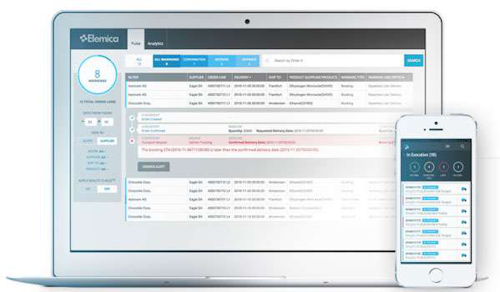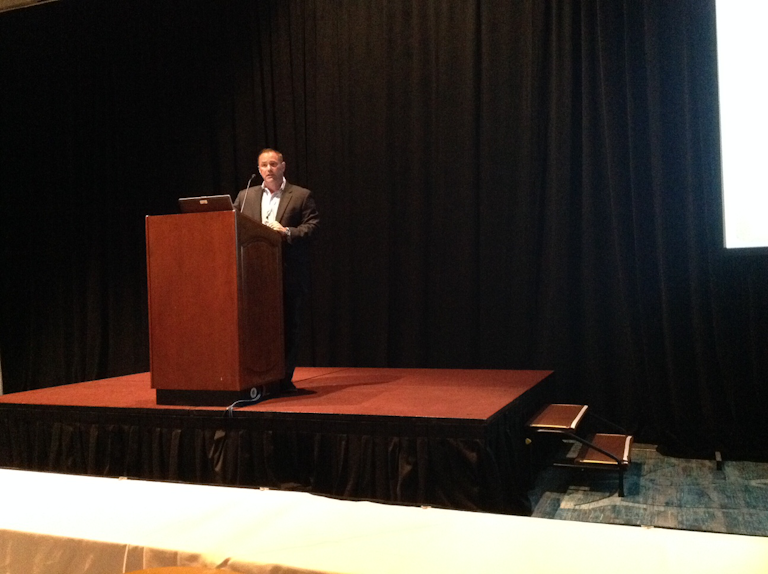Blockchain is the latest buzzword in transportation and logistics, but how and when this “digital ledger” technology will make an impact remains to be seen.

Perhaps the most anticipated benefit of the technology for carriers is to create smart contracts with shippers to have self-executing freight transactions.
With a smart contract, the different elements in a freight transaction can execute automatically when all parties involved in the transaction have their IT systems set up to send and receive information according to terms.
Blockchain describes a set of protocols that will automatically record the transactions and store their data across many computers in a peer-to-peer network, explains Jason Kerner, vice president at project44, which develops connectivity platforms for shippers and carriers.
“It’s an excellent way to ensure information symmetry, as transactional data can only be accepted into the blockchain once a kind of consensus is reached,” wrote Kerner in a recent blog published on LinkedIn. “Once the data has been verified, it is added to a block of information tied to the rest of the blocks in a series, creating a ‘chain’ of information, or a history of transactions.”
A few examples of the different blocks of information that can be included in a smart contract are the order details, shipment status updates, proof-of-delivery and accessorial charges like detention. Ideally, blockchain technology will automatically verify all of the transaction details such as matching rate quotes to the invoice amounts and accessorial charges to automate the freight payment process.
“The potential is clearly there, and although the industry isn’t completely certain how it will implement a technology like blockchain, it makes sense to start preparing for it,” he says.
Kerner recommends that carriers start now by ensuring they have a “modern technology infrastructure” to transfer consistent, normalized data in real-time to whatever system or third party will be managing the blockchain. The method companies will use to transfer information to a blockchain will be application programming interface (APIs), he says.
APIs simplify integration and facilitate the transfer of data in the transportation and logistics industry. They are the “gateway” for motor carriers to add information to a blockchain as well as to receive information into their own software systems, he explains.
Project44 has developed systems that use APIs to integrate with carrier, shipper and 3PL information systems to facilitate real-time sharing of information for visibility.
As new blockchains are developed, Kerner says project44 will work with its customers to facilitate the data exchange using APIs.
Smart contracts
TMW Systems recently peeled the wrapper from a blockchain platform it has been developing this year. The development started soon after it released a web-based application for carriers and freight brokers in January to manage pricing and bidding activities with shippers.
Tim Leonard, TMW’s chief information officer, saw an opportunity to integrate this new Engage.Bid application with technology that shippers use to automate the RFP process.

Tim Leonard, chief technology officer of TMW Systems
More than 4,000 carriers and freight brokers use transportation management software (TMS) products from TMW, Leonard says.
In the past few years, a number of technology companies that provide freight visibility solutions for shippers have integrated with TMW products to get access to shipment tracking information from carriers.
One of the freight visibility providers, 10-4 Systems, stood out to Leonard for the RFP system it developed for shippers. He saw an opportunity to integrate Engage.Bid with the RFP system to have a direct flow of information between shippers and carriers to streamline the bidding process.
This vision was part of the reason TMW acquired 10-4 Systems in September 2017.
Prior to acquiring 10-4, TMW had already started to develop a “metadata configuration” called the Trimble Freight Cloud to enable carriers and shippers to negotiate smart contracts.
The impetus for the Freight Cloud was carriers being upset with freight visibility providers using their data for more than to track shipments, such as gaining market insights on lane and capacity data.
“What we preach is your data doesn’t go anywhere unless you authorize it,” he says.
The Trimble Freight Cloud is embedded in Engage.Bid for carriers and shippers to create smart contracts by choosing, and negotiating, data they wish to exchange in freight transactions, he says. The possibilities include accounting data, driver information, trip moves, stops, commodity types and more.
“If you do not have the data in a place that you understand it, and can steward and manage it, (blockchain) won’t last,” he says.
Once a smart contract is negotiated with a shipper, the various information “blocks” of the contract can be exported to a blockchain so that freight transactions can execute automatically, he says.
A blockchain can automatically send shippers notifications as a shipment progresses, for example, and recognize when a carrier delivered a load to trigger funds held in escrow for payment. The information sent to a blockchain is encrypted and the full transaction history is recorded in a digital ledger.
Leonard estimates that 40 percent of back office labor could be eliminated by using blockchain technology to automate freight payments. This would save shippers money by eliminating the need for third-party freight payment providers, and save carriers money by eliminating their credit and collections process.
Setting standards
To be ready for prime time, blockchain technology will have to clear the same hurdles that current protocols like electronic data interchange (EDI) and APIs have to exchange information.
Cindi Hane, vice president of logistics product management for Elemica, doesn’t see blockchain replacing EDI or APIs. Instead, it will be another layer, or extension, of technologies that fleets and shippers already use.

Photo credit: Load Delivered
Elemica provides a business network tailored for supply chains in the manufacturing and chemical industries that allows shippers and carriers to connect, communicate, book shipments and exchange documents electronically.
The company ties the information systems of carriers to the enterprise resource planning (ERP) systems of shippers using various methods. For direct integration with the carrier’s back-office system, Elemica uses APIs or EDI messages. Carriers can also use a secure web portal to manually view and enter data.
Another option is to respond to automatically generated emails for load tenders and shipment status updates, for instance.
By connecting carriers to its network with these methods, Elemica provides shippers with freight visibility, analytics and management-by-exception models that alert to loads running late and other events.
One of the ongoing challenges of managing the network is to ensure that data definitions are consistent for all parties and maintain data quality, she says.
As an example, parties may argue about a detention event. The carrier may say the event was recorded while the driver was waiting at the dock, while the shipper may claim that the carrier started charging as soon as the driver entered the gate.
These same data challenges will persist with blockchain technology. Carriers and shippers will still have to negotiate the meaning of data for a smart contract to work.
“Blockchain is not going to fix the data interpretation problem,” she says.
Original Source: https://www.ccjdigital.com/will-blockchain-extend-or-disrupt-your-business/#
